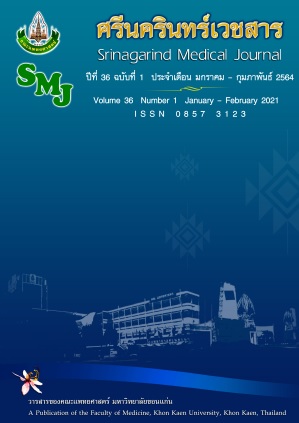Association of Self-Care Behaviors and Beliefs about Diabetes with Glycemic Control of Type 2 Diabetic Patients in a Multiethnicity Area, Nakae District, Nakhonphanom Province
Keywords:
Type 2 diabetic patients; ethnic; self-care behavior; beliefs about diabetes; glycemic controlAbstract
Background and objectives: Self-care behavior and health beliefs may affect blood sugar control of type 2 diabetes. This study aimed to examine the relationship of self-care behaviors and beliefs about diabetes with the level of HbA1c of type 2 diabetic patients.
Methods: This cross-sectional analytical study was conducted in 290 type 2 diabetic patients living in Nakae District, Nakhonphanom Province. Information was collected during January to February 2020 using a structured questionnaire including general characteristics, self-care behaviors, and beliefs about diabetes. Global physical activity questionnaire was used to collect data of physical activity. HbA1c data was retrieved from the medical record of Nakae Hospital. Multiple logistic regression was performed to analyze the association of self-care behavior and the belief about diabetes with blood sugar level.
Results: Eighty percent of the participants were female with an average age of 58.9 ± 9.7 years. They belonged to three different ethnic groups, namely 50.7 to the Thai Kaleng, 19.3% to the ThaiYor and 17.6% to the Phutai. Only 20.7% of the patients were able to properly control their blood sugar (HbA1c < 7%), but 59.3% had elevated HbA1c values (HbA1c ≥ 8%). For multiple logistic regression analysis which was adjusted by ethnic groups showed that age ≥ 60 years (ORadj = 0.37, 95% CI: 0.21 - 0.62), having diabetes for ≥ 10 years (ORadj = 2.13, 95% CI: 1.25 - 3.62) and frequent consuming sweet drinks (≥ 1 time/week) (ORadj= 1.71, 95% CI: 1.03 - 2.83) were statistical significantly associated with poorly controlled of blood sugar (HbA1c ≥ 8%). While the beliefs about diabetes was not found to be associated with HbA1c level.
Conclusions: The majority of the patients with type 2 diabetes poorly controlled their blood sugar level. Implementing programs to promote the health of diabetic patients, should emphasis on reducing the consumption of sweetened beverages, especially for those with diabetes for a long time and in their middle age.
References
2. American Diabetes Association. Standards of medical care in diabetes: Diabetes Care 2014; 37: (Suppl. 1): S14–S80.
3. วิชัย เอกพลากร, บรรณาธิการ. การสำรวจสุขภาพประชาชนไทยโดยการตรวจร่างกายครั้งที่ 5 พ.ศ. 2557. นนทบุรี: สถาบันวิจัยระบบสาธารณสุข, 2559.
4. กระทรวงสาธารณสุข.ร้อยละของผู้ป่วยโรคเบาหวานที่ควบคุมระดับน้ำตาลได้ดีปีงบ
ประมาณ 2562. [อินเตอร์เน็ต] 2562 [เข้าถึงเมื่อ 28 พฤษภาคม 2562]; เข้าถึงได้จาก: https://hdcservi ce.moph.go.th
5. Evert AB, Boucher JL, Cypress M, Dunbar SA, Franz MJ, Mayer-Davis EJ, et al. Nutrition therapy recommendations for the management of adults with diabetes. Diabetes Care 2014; 37(suppl 1): S120-143.
6. Becker MH. The health belief model and preventive health behavior. Health Education Monographs 1974; 2: 385-54.
7. สำนักนโยบายและยุทธศาสตร์ กระทรวงสาธารณสุข. แนวโน้มผู้ป่วยโรคเบาหวานจังหวัดนครพนม พ.ศ. 2557-2562. [อินเตอร์เน็ต] 2562. [เข้าถึงเมื่อ 29 พฤษภาคม 2562]; เข้าถึงได้จาก: https://hdcservice.moph.go.th/hdc/reports/report.
8. สำนักงานสาธารณสุขจังหวัดนครพนม. กลุ่มรายงานข้อมูลเพื่อตอบสนอง Service Plan สาขาโรคไม่ติดต่อ. [อินเตอร์เน็ต] 2562. [เข้าถึงเมื่อ 10 พฤษภาคม 2562]; เข้าถึงได้จาก: https://npm.hdc.moph. go.th/hdc/reports/page.php?cat_id=b2b59e64c4e6c92d4b1ec16a599d882b.
9. Hsieh FY, Bloch DA, Larsen MD. A simple method of sample size calculation for linear and logistic regression. Statistics in Medicine 1998; 17: 1623-34.
10. Hosmer DW, Lemeshow S. Applied Logistic Regression. New York : Wiley, 2000.
11. Best JW. Research in education: 3rd ed. Englewood Cliffs, NJ: Prentice-Hall, 1997.
12. World Health Organization. Global Physical Activity Surveillance : GPAQ Analysis Guide [Internet] 2015. [cited September 11, 2019]; Available from: http://www.who.int/chp/steps/GPAQ/en/.
13. หอสมุดแห่งชาติเฉลิมพระเกียรติ ฯ นครพนม. ตำนานชาวย้อและเผ่าต่างๆ ในนครพนม. [อินเตอร์เน็ต] 2556. [เข้าถึงเมื่อ 10 มีนาคม 2563]. เข้าถึงได้จาก http://www.finearts.go.th/nakhonpha nomlibrary/parameters/km/5.
14. นวรัตน์ บุญภิละ. วิถีชีวิต ความเชื่อ และภูมิปัญญาของชาวผู้ไทในอีสาน. วารสารพื้นถิ่นโขงชีมูล 2558; 1: 111-132.
15. ปกาสิต โอวาทกานนท์. ผลการดูแลรักษาเบาหวานและปัจจัยที่มีความสัมพันธ์กับการไม่สามารถควบคุมระดับน้ำตาลในเลือดของผู้ป่วยเบาหวานชนิดที่ 2 ในโรงพยาบาลทรายมูล. ศรีนครินทร์เวชสาร 2554; 26: 339-349.
16. อมรรัตน์ ภิรมย์ชม, อนงค์ หาญสกุล. ปัจจัยที่มีอิทธิพลต่อพฤติกรรมการดูแลตนเองของผู้ป่วยโรคเบาหวานชนิดที่ 2 ในอำเภอหนองบัวระเหว จังหวัดชัยภูมิ. วารสารสำนักงานป้องกันควบคุมโรคที่ 6 จังหวัดขอนแก่น 2555; 19: 1-10.
17. วิมลรัตน์ จงเจริญ, วันดี คหะวงศ์, อังศุมา อภิชาโต, อรนิช แสงจันทร์, ประภาพร ชูกำเหนิด, กัลยาณี บุญสิน และคณะ. รูปแบบการส่งเสริมการดูแลตนเอง เพื่อควบคุมระดับน้ำตาลในเลือดของผู้ป่วยเบาหวานชนิดที่ 2. สงขลานครินทร์เวชสาร 2551; 26: 71-84.
18. อนัญญา ประดิษฐปรีชา, เบญจา มุกตพันธุ์. ปัจจัยด้านการบริโภคอาหารที่มีผลต่อการเป็นโรคเบาหวานชนิดที่ 2 ในประชากร อำเภอนากลาง จังหวัดหนองบัวลำภู. วารสารวิจัยมข. ฉบับบัณฑิตศึกษา2555; 12: 61-69.
19. วรดา มาลา, ประจักร บัวผัน. การดูแลสุขภาพตนเองของผู้ป่วยเบาหวานในเขตพื้นที่โรงพยาบาลส่งเสริมสุขภาพตำบลห้วยมะหรี่ ตำบลโนนเมือง อำเภอโนนสัง จังหวัดหนองบัวลำภู. วารสารสำนักงานป้องกันควบคุมโรคที่ 7 จังหวัดขอนแก่น 2560; 24:71-79.
20. ฤทธิรงค์ บูรพันธ์, นิรมล เมืองโสม. ปัจจัยที่มีผลต่อการควบคุมระดับน้ำตาลในเลือดไม่ได้ของผู้ป่วยเบาหวานชนิดที่ 2 โรงพยาบาลสร้างคอม จังหวัดอุดรธานี. วารสารวิจัยสาธารณสุขศาสตร์ มหาวิทยาลัยขอนแก่น 2556; 6: 102-109.
21. สมาคมโรคเบาหวานแห่งประเทศไทย. แนวทางเวชปฏิบัติสำหรับโรคเบาหวาน. พิมพ์ครั้งที่ 2. กรุงเทพฯ: ศรีเมืองการพิมพ์, 2560.
22. วรารัตน์ ปาจรียานนท์, ปัตพงษ์ เกษสมบูรณ์, ลุนณี สุวรรณโมรา, สุพรรัตน์ ช่องวารินทร์, นวรัตน์ ภูเหิน. ปัจจัยที่สัมพันธ์กับภาวะโรคเบาหวานที่ควบคุมไม่ได้. วารสารโรงพยาบาลมหาสารคาม 2561; 15: 118-127.
23. El Bilbeisi AH, Hosseini S, Djafarian K. Association of dietary patterns with diabetes complications among type 2 diabetes patients in Gaza Strip, Palestine: a cross sectional study. J Health Popul Nutr 2017; 36: 1-11.
24. สำนักโภชนาการ. กระทรวงสาธารณสุข. อิ่ม อร่อย ได้สุขภาพ สไตล์เบาหวาน. พิมพ์ครั้งที่ 4. กรุงเทพฯ: บริษัทสามเจริญพาณิชย์จำกัด, 2561.
25. สุวัฒน์ ศิริเเก่นทราย. ความเชื่อด้านสุขภาพที่มีความสัมพันธ์กับการควบคุมระดับน้ำตาลในเลือดของผู้ป่วยเบาหวานชนิดที่ 2 ตำบลกุดจิก อำเภอเมือง จังหวัดหนองบัวลำภู. วารสารวิชาการเซาธ์อีสท์บางกอก 2562; 5: 55-68.
26. Almetwazi M, Alwhaibi M, Balkhi B, Almohaini H, Alturki H, Alhawassi T, et al. Factors associated with glycemic control in type 2 diabetic patients in Saudi Arabia. Saudi Pharm J 2019; 27: 384-388.
27. เพรียวพันธุ์ อุสาย, นิรมล เมืองโสม, ประยูร โกวิทย์. ปัจจัยที่มีความสัมพันธ์กับการควบคุมระดับน้ำตาลในเลือดของผู้ป่วยเบาหวานชนิดที่ 2 ที่ขึ้นทะเบียนรักษาในโรงพยาบาลส่งเสริมสุขภาพตำบลเขตรับผิดชอบของโรงพยาบาลบ้านไผ่จังหวัดขอนแก่น. วารสารวิจัยสาธารณสุขศาสตร์มหาวิทยาลัยขอนแก่น 2555; 5: 11-20.
28. ชลวิภา สุลักขณานุรักษ์, วโรดม ใจสนุก, เบญจา มุกตพันธุ์. ความสัมพันธ์ของภาวะซึมเศร้าและความเครียดกับระดับน้ำตาลสะสมในเลือดของผู้ป่วยเบาหวานชนิดที่ 2 ที่มารับการรักษาที่คลินิกเบาหวานของโรงพยาบาลน้ำพอง จังหวัดขอนแก่น. ศรีนครินทร์เวชสาร 2559; 31: 34-46.
29. หฤทัย เสือบัว. ปัจจัยส่วนบุคคลและลักษณะทางคลินิกของผู้ป่วยเบาหวานชนิดที่ 2 ศูนย์บริการสาธารณสุข 3 สวนพริกไทย. ศรีนครินทร์เวชสาร 2562; 34: 328-335.
30. Neesha RP, Carolyn CG, Christine B, Anne K, Christian B, David R. Illness beliefs and the sociocultural context of diabetes self-management in British South Asians: a mixed methods study. BMC Fam Pract 2015; 16: 1-12.
31. สมเกียรติ สุทธรัตน์, ปาริชาติ เมืองขวา. ภูมิปัญญาท้องถิ่นด้านสุขภาพภาคตะวันออกเฉียงเหนือกับการส่งเสริมสุขภาพจิตผู้สูงอายุ. วารสารมหาวิทยาลัยนครพนม 2561; 8: 255-261.
32. ลือชัย ศรีเงินยวง. สังคมวิทยาและมานุษยวิทยาการแพทย์. พิมพ์ครั้งที่ 7. นนทบุรี : มหาวิทยาลัยสุโขทัยธรรมาธิราช, 2555.




